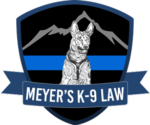It can. The Heck doctrine stands for the concept that if the defendant admitted to or was found guilty of his bad actions in resisting and/or fighting with the police, he cannot then sue LE for excessive force as a finding of resisting and/or fighting with police necessarily includes a finding that LE was acting within the scope of their duties; i.e., did not use excessive force or perform an illegal arrest. “We hold, that in order to recover damages for … harm caused by actions whose unlawfulness would render a conviction … invalid, the [complainant] must prove the conviction reversed … or otherwise called into question ….” Heck v. Humphrey (1994) 512 U.S. 477, 486. But see Hooper v. County of San Diego (9th Cir. 2011) 629 F.3d 1127, where the court concluded “that a conviction under California Penal Code section 148 does not bar a section 1983 claim for excessive force under Heck when the conviction and the section 1983 claim are based on different actions during “one continuous transaction.”” This means that if there is some action on the part of LE that is excessive force, the Heck doctrine will not apply.
The best practice when sending a resisting arrest or assault on LE case to the District Attorney is to be in contact with the assigned deputy and make sure that defendant pleads to those counts or, at a minimum, admits to probable cause for the arrest on those counts, which necessarily includes an acknowledgment that LE acted appropriately within the scope of their duties.
